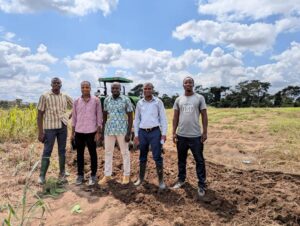The Council for Scientific and Industrial Research (CSIR)-Crops Research Institute has officially begun field preparations for a series of agroecological and conventional maize trials at the newly established Multicultural Technology Park in Fumesua. Spanning a 15-acre site, this innovative research facility aims to foster sustainable agricultural practices as part of the Agroecology and Circular Economy for Ecosystem Services in Sub-Saharan Africa (ACE4ES) project.
The maize trials mark the first phase of this ambitious initiative, which seeks to compare conventional farming methods, such as high tillage and synthetic fertilizer use, with agroecological practices that reduce emissions like nitrous oxide and black carbon. The ultimate goal is to identify sustainable practices that enhance soil health, boost productivity, and help mitigate climate change impacts.

Dr. Eric Owusu Danquah and his research team, which includes Dr. Priscilla Ribeiro, Dr. Clement Oppong Peprah, Dr. Jeanette Aduhene-Chinbuah, Dr. Steven Arthur, and Dr. Felix Frimpong, will be leading the trials. The research will focus on critical aspects such as the reduction of greenhouse gas emissions, the benefits of maize-legume intercropping, and the integration of agroforestry systems into maize cultivation.
“This park will play a critical role in promoting climate-smart agriculture that benefits both people and the environment,” remarked Dr. Kwaku Onwona-Hwesofour Asante, Project Lead and Principal Investigator for the ACE4ES project. He highlighted the park’s potential as a pan-African hub for agricultural innovation, where scientists can experiment with sustainable practices and contribute to food security across Africa.
Following the maize trials, the ACE4ES project will extend its research to rice methane reduction, composting trials, and integrated pest management. These experiments aim to further validate agroecological methods that can be scaled to other regions across Africa. The Multicultural Technology Park will also be open to scientists from other countries, fostering collaboration in the pursuit of resilient, climate-smart agricultural solutions.
The Multicultural Technology Park is established with funding support from the Climate and Clean Air Coalition (CCAC) under UNEP
